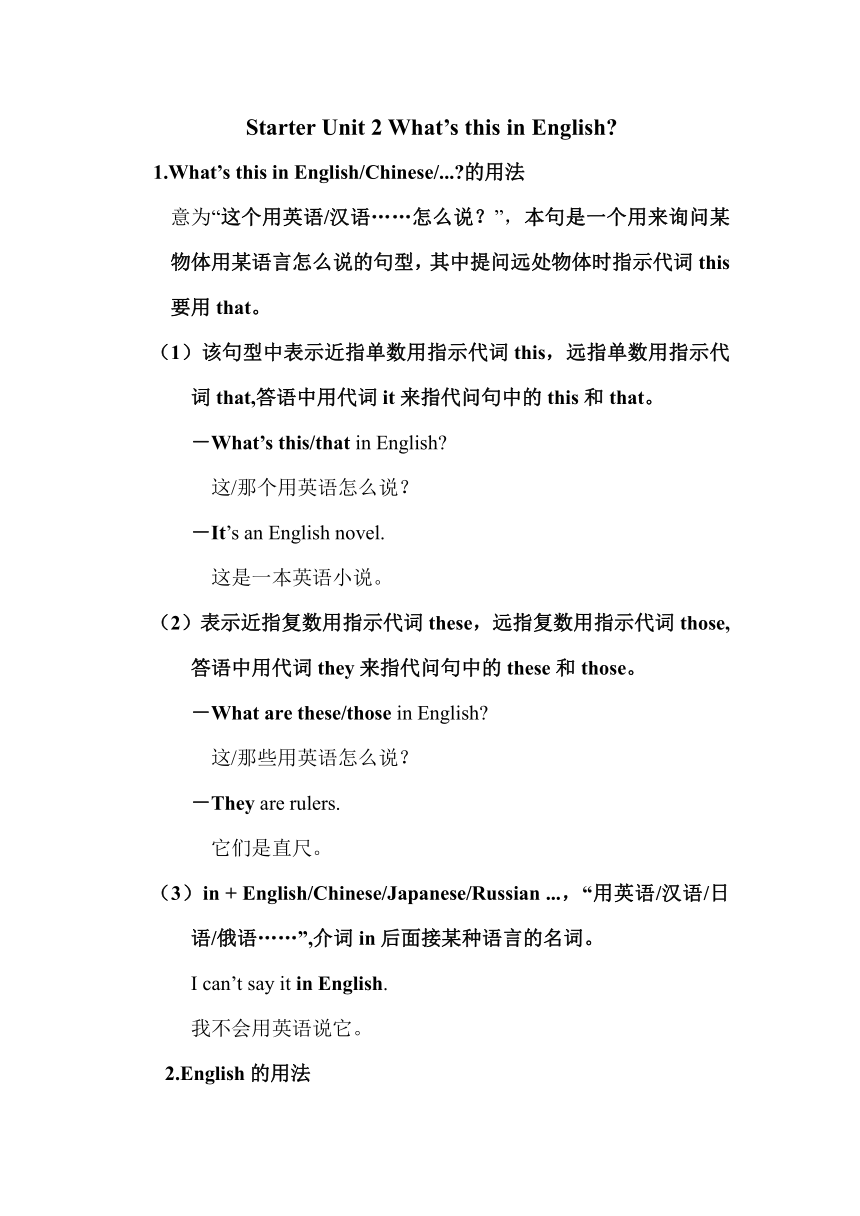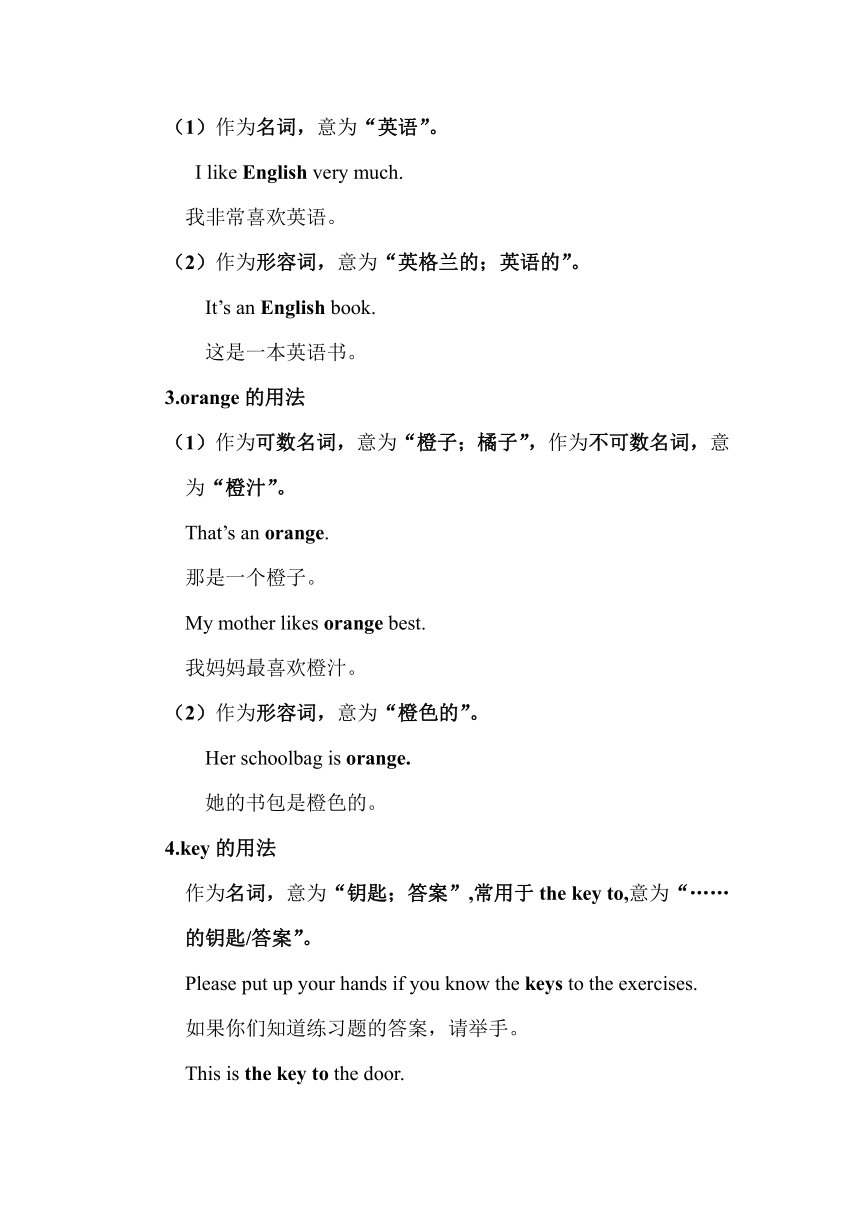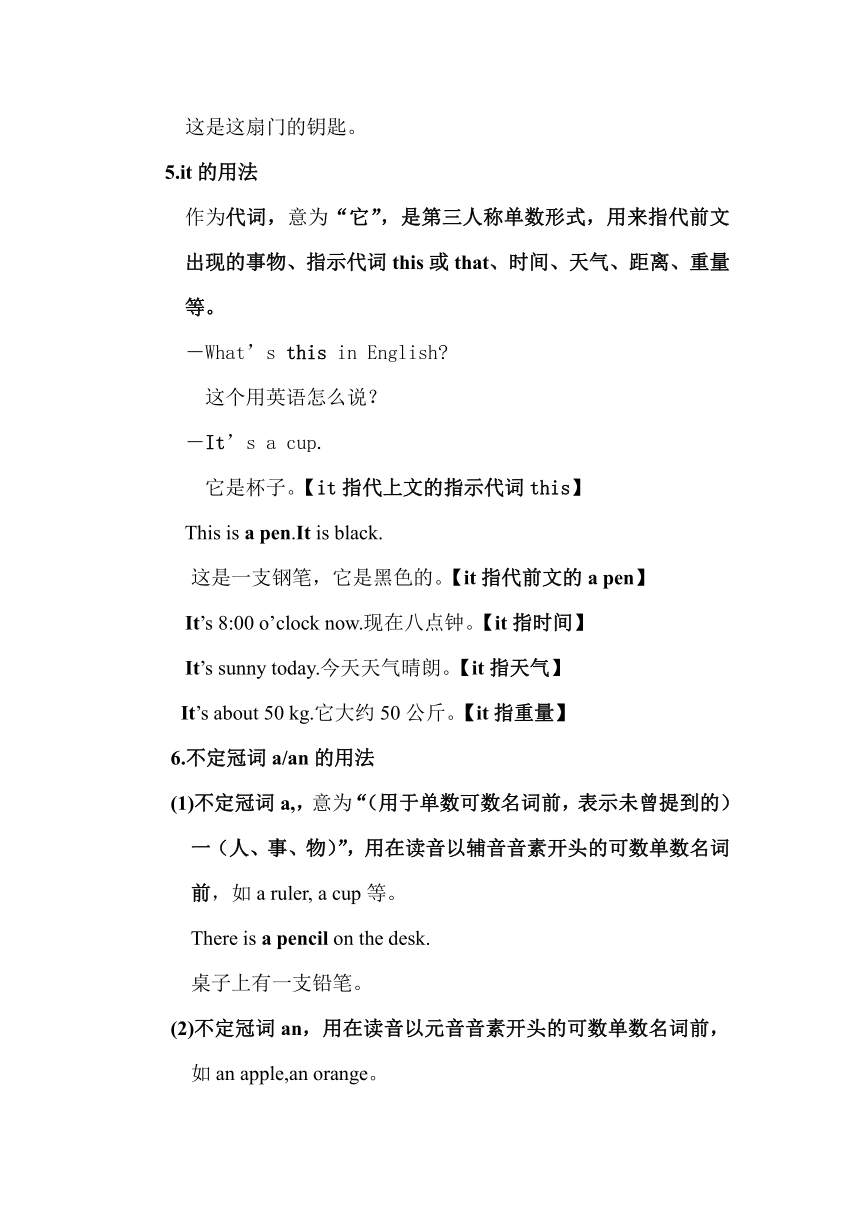Starter Unit 2 What's this in English? 教材重要知识点梳理
文档属性
| 名称 | Starter Unit 2 What's this in English? 教材重要知识点梳理 |

|
|
| 格式 | doc | ||
| 文件大小 | 174.0KB | ||
| 资源类型 | 教案 | ||
| 版本资源 | 人教新目标(Go for it)版 | ||
| 科目 | 英语 | ||
| 更新时间 | 2021-08-31 17:31:46 | ||
图片预览



文档简介
Starter
Unit
2
What’s
this
in
English?
1.What’s
this
in
English/Chinese/...?的用法
意为“这个用英语/汉语……怎么说?”,本句是一个用来询问某物体用某语言怎么说的句型,其中提问远处物体时指示代词this要用that。
(1)该句型中表示近指单数用指示代词this,远指单数用指示代词that,答语中用代词it来指代问句中的this和that。
-What’s
this/that
in
English?
这/那个用英语怎么说?
-It’s
an
English
novel.
这是一本英语小说。
(2)表示近指复数用指示代词these,远指复数用指示代词those,答语中用代词they来指代问句中的these和those。
-What
are
these/those
in
English?
这/那些用英语怎么说?
-They
are
rulers.
它们是直尺。
(3)in
+
English/Chinese/Japanese/Russian
...,“用英语/汉语/日语/俄语……”,介词in后面接某种语言的名词。
I
can’t
say
it
in
English.
我不会用英语说它。
2.English的用法
(1)作为名词,意为“英语”。
I
like
English
very
much.
我非常喜欢英语。
(2)作为形容词,意为“英格兰的;英语的”。
It’s
an
English
book.
这是一本英语书。
3.orange的用法
(1)作为可数名词,意为“橙子;橘子”,作为不可数名词,意为“橙汁”。
That’s
an
orange.
那是一个橙子。
My
mother
likes
orange
best.
我妈妈最喜欢橙汁。
(2)作为形容词,意为“橙色的”。
Her
schoolbag
is
orange.
她的书包是橙色的。
4.key的用法
作为名词,意为“钥匙;答案”,常用于the
key
to,意为“……
的钥匙/答案”。
Please
put
up
your
hands
if
you
know
the
keys
to
the
exercises.
如果你们知道练习题的答案,请举手。
This
is
the
key
to
the
door.
这是这扇门的钥匙。
5.it的用法
作为代词,意为“它”,是第三人称单数形式,用来指代前文出现的事物、指示代词this或that、时间、天气、距离、重量等。
-What’s
this
in
English?
这个用英语怎么说?
-It’s
a
cup.
它是杯子。【it指代上文的指示代词this】
This
is
a
pen.It
is
black.
这是一支钢笔,它是黑色的。【it指代前文的a
pen】
It’s
8:00
o’clock
now.现在八点钟。【it指时间】
It’s
sunny
today.今天天气晴朗。【it指天气】
It’s
about
50
kg.它大约50公斤。【it指重量】
6.不定冠词a/an的用法
(1)不定冠词a,,意为“(用于单数可数名词前,表示未曾提到的)一(人、事、物)”,用在读音以辅音音素开头的可数单数名词前,如a
ruler,
a
cup等。
There
is
a
pencil
on
the
desk.
桌子上有一支铅笔。
(2)不定冠词an,用在读音以元音音素开头的可数单数名词前,如an
apple,an
orange。
There
is
an
orange/apple
on
the
desk.
桌子上有个橙子/苹果。
7.Spell的用法
(1)spell作为及物动词,意为“拼写”。
常用于:
Can
you
spell
“ruler”,please?
你可以拼写一下“ruler”吗?
How
do
you
spell
it?
你是怎么拼写它的?
(2)其名词形式为spelling,意为“拼写”。
The
spelling
of
the
world
is
very
difficult.
这个单词的拼写非常难。
(3)教材中
Spell
it,please.意为“请把它拼写一下”,该句是一个祈使句。祈使句常用来表达要求、请求、劝告、命令等语气,祈使句通常省略主语you。
常见祈使句,如下:
①以V(即动词原形)开头的祈使句
Open
the
door,please.
=
Please
open
the
door.
请把门打开。
②以Be动词开头的祈使句
Be
careful!小心点!
③以D(don’t)开头的祈使句,实际上也就是第①种情况中的否定句。
Don’t
open
the
door!
不要开门!
④以N(no或者never)开头的祈使句
No
parking!
禁止泊车!
Never
put
off
what
can
be
done
today
till
tomorrow.
今日事,今日毕。
Unit
2
What’s
this
in
English?
1.What’s
this
in
English/Chinese/...?的用法
意为“这个用英语/汉语……怎么说?”,本句是一个用来询问某物体用某语言怎么说的句型,其中提问远处物体时指示代词this要用that。
(1)该句型中表示近指单数用指示代词this,远指单数用指示代词that,答语中用代词it来指代问句中的this和that。
-What’s
this/that
in
English?
这/那个用英语怎么说?
-It’s
an
English
novel.
这是一本英语小说。
(2)表示近指复数用指示代词these,远指复数用指示代词those,答语中用代词they来指代问句中的these和those。
-What
are
these/those
in
English?
这/那些用英语怎么说?
-They
are
rulers.
它们是直尺。
(3)in
+
English/Chinese/Japanese/Russian
...,“用英语/汉语/日语/俄语……”,介词in后面接某种语言的名词。
I
can’t
say
it
in
English.
我不会用英语说它。
2.English的用法
(1)作为名词,意为“英语”。
I
like
English
very
much.
我非常喜欢英语。
(2)作为形容词,意为“英格兰的;英语的”。
It’s
an
English
book.
这是一本英语书。
3.orange的用法
(1)作为可数名词,意为“橙子;橘子”,作为不可数名词,意为“橙汁”。
That’s
an
orange.
那是一个橙子。
My
mother
likes
orange
best.
我妈妈最喜欢橙汁。
(2)作为形容词,意为“橙色的”。
Her
schoolbag
is
orange.
她的书包是橙色的。
4.key的用法
作为名词,意为“钥匙;答案”,常用于the
key
to,意为“……
的钥匙/答案”。
Please
put
up
your
hands
if
you
know
the
keys
to
the
exercises.
如果你们知道练习题的答案,请举手。
This
is
the
key
to
the
door.
这是这扇门的钥匙。
5.it的用法
作为代词,意为“它”,是第三人称单数形式,用来指代前文出现的事物、指示代词this或that、时间、天气、距离、重量等。
-What’s
this
in
English?
这个用英语怎么说?
-It’s
a
cup.
它是杯子。【it指代上文的指示代词this】
This
is
a
pen.It
is
black.
这是一支钢笔,它是黑色的。【it指代前文的a
pen】
It’s
8:00
o’clock
now.现在八点钟。【it指时间】
It’s
sunny
today.今天天气晴朗。【it指天气】
It’s
about
50
kg.它大约50公斤。【it指重量】
6.不定冠词a/an的用法
(1)不定冠词a,,意为“(用于单数可数名词前,表示未曾提到的)一(人、事、物)”,用在读音以辅音音素开头的可数单数名词前,如a
ruler,
a
cup等。
There
is
a
pencil
on
the
desk.
桌子上有一支铅笔。
(2)不定冠词an,用在读音以元音音素开头的可数单数名词前,如an
apple,an
orange。
There
is
an
orange/apple
on
the
desk.
桌子上有个橙子/苹果。
7.Spell的用法
(1)spell作为及物动词,意为“拼写”。
常用于:
Can
you
spell
“ruler”,please?
你可以拼写一下“ruler”吗?
How
do
you
spell
it?
你是怎么拼写它的?
(2)其名词形式为spelling,意为“拼写”。
The
spelling
of
the
world
is
very
difficult.
这个单词的拼写非常难。
(3)教材中
Spell
it,please.意为“请把它拼写一下”,该句是一个祈使句。祈使句常用来表达要求、请求、劝告、命令等语气,祈使句通常省略主语you。
常见祈使句,如下:
①以V(即动词原形)开头的祈使句
Open
the
door,please.
=
Please
open
the
door.
请把门打开。
②以Be动词开头的祈使句
Be
careful!小心点!
③以D(don’t)开头的祈使句,实际上也就是第①种情况中的否定句。
Don’t
open
the
door!
不要开门!
④以N(no或者never)开头的祈使句
No
parking!
禁止泊车!
Never
put
off
what
can
be
done
today
till
tomorrow.
今日事,今日毕。
同课章节目录
- starters 预备篇(2012秋审查)
- Unit 1 Good morning !
- Unit 2 What’s this in English?
- Unit 3 What color is it ?
- Unit 1 My name's Gina.
- Section A
- Section B
- Unit 2 This is my sister.
- Section A
- Section B
- Unit 3 Is this your pencil?
- Section A
- Section B
- Unit 4 Where's my schoolbag?
- Section A
- Section B
- Unit 5 Do you have a soccer ball?
- Section A
- Section B
- Unit 6 Do you like bananas?
- Section A
- Section B
- Unit 7 How much are these socks?
- Section A
- Section B
- Unit 8 When is your birthday?
- Section A
- Section B
- Unit 9 My favorite subject is science.
- Section A
- Section B
